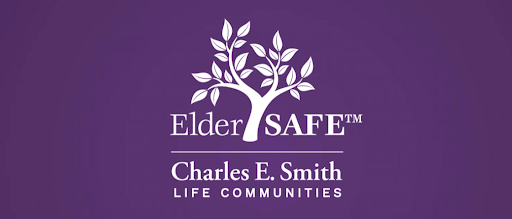October is National Domestic Violence Awareness Month, and SmithLife Homecare takes its part in the effort to make homes safe and happy for everyone, particularly older adults. We believe in education and prevention, and our team partners with Charles E. Smith Life Communities, whose ElderSAFE Center program helps lead the way on this important issue.
What is Domestic Violence?
Domestic Violence is using physical, sexual, emotional or financial control over another person in an intimate partner relationship, like a spouse or dating partner. Family members can also commit abuse against an older adult. Abuse committed outside of the intimate partner or family relationship is commonly referred to as elder abuse.
According to the National Council on Aging, “elder abuse includes physical abuse, emotional abuse, sexual abuse, exploitation, neglect, and abandonment.” It also includes confinement, passive neglect, willful deprivation, and financial exploitation. Millions of Americans aged over sixty experience some form of elder abuse annually, and NCOA estimates that “the annual loss by victims of financial abuse is estimated to be at least $36.5 billion.”
What Are the Signs of Elder Abuse?
In addition to obvious signs of physical injury, there are many clues that may indicate that elder abuse is possibly happening. Things like unexplained weight loss, missing medical care, and unsanitary living conditions can mean that the individual is experiencing physical abuse or neglect. Sudden withdrawal from socializing, increased fear and anxiety or changes in sleep may indicate emotional abuse. Financial abuse may be indicated by forged signatures on financial documents or unpaid bills.
What Can Be Done?
NCOA has many recommendations for what can be done to prevent elder abuse. Education of older adults as well as the people who interact with them like caregivers and family members is an important first step. Older adults should try and stay active and connected to their communities to prevent social isolation, which can lead to elder abuse. It’s also important to work with reputable, trained professionals and caregivers who know how to spot the signs of elder abuse and who will report the issue to the proper authorities.
If you, a loved one, friend or neighbor is experiencing or you suspect may be experiencing elder abuse, please call your local Adult Protective Services (APS) office:
Maryland: 1-800-332-6347
Washington D.C.: 202-541-3950
Virginia: 1-888-832-3858
If you would like to make a referral to the ElderSAFE Center for an older adult in need of safe temporary shelter who is experiencing abuse, neglect, or financial exploitation, please call the ElderSAFE Center’s language accessible helpline Monday through Friday from 9:00am-5:00pm at 301-816-5099. To learn more about the ElderSAFE Center and available community resources visit: https://www.smithlifecommunities.org/care-services/eldersafe-care/
Note from the author-
Thank you for reading our latest blog post at SmithLife Homecare. If our content has been helpful, please share it with others. We’re committed to providing valuable insights on homecare and well-being, with fresh content monthly. We value your feedback and suggestions; feel free to leave a comment below. Your support helps us make a difference. Stay tuned for our monthly blog posts!

About the Author-
Renan Augusto is the Director of Digital Marketing for SmithLife Homecare. SmithLife Homecare is a senior in-home care provider located in Rockville, MD & Washington, D.C. Renan has a Master of Science in Digital Marketing. He helps families with starting home care service. He holds credentials as a Certified Dementia Practitioner, Senior Home Safety Specialist, and Meta Certified Digital Marketer.
